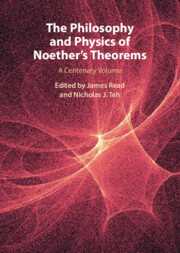Book contents
- Frontmatter
- Contents
- Contributors
- Introduction
- 1 The Noether Theorems in Context
- 2 Felix Klein and Emmy Noether on Invariant Theory and Variational Principles
- 3 Moscow, Oxford, or Princeton: Emmy Noether’s Move from Göttingen (1933)
- 4 Getting to the Bottom of Noether’s Theorem
- 5 BV Quantisation in Perturbative Algebraic QFT: Fundamental Concepts and Perspectives
- 6 Divergence Invariant Variational Problems
- 7 Do Symmetries ‘Explain’ Conservation Laws? The Modern Converse Noether Theorem vs Pragmatism
- 8 Noether’s First Theorem and the Energy-Momentum Tensor Ambiguity Problem
- 9 Noether’s Theorems and Energy in General Relativity
- 10 Geometric Objects and Perspectivalism
- 11 Substantive General Covariance and the Einstein–Klein Dispute: A Noetherian Approach
- 12 Noether Charges, Gauge-Invariance, and Non-Separability
- 13 Observability, Redundancy, and Modality for Dynamical Symmetry Transformations
- 14 The Gauge Argument: A Noether Reason
- Index
2 - Felix Klein and Emmy Noether on Invariant Theory and Variational Principles
Published online by Cambridge University Press: 22 September 2022
- Frontmatter
- Contents
- Contributors
- Introduction
- 1 The Noether Theorems in Context
- 2 Felix Klein and Emmy Noether on Invariant Theory and Variational Principles
- 3 Moscow, Oxford, or Princeton: Emmy Noether’s Move from Göttingen (1933)
- 4 Getting to the Bottom of Noether’s Theorem
- 5 BV Quantisation in Perturbative Algebraic QFT: Fundamental Concepts and Perspectives
- 6 Divergence Invariant Variational Problems
- 7 Do Symmetries ‘Explain’ Conservation Laws? The Modern Converse Noether Theorem vs Pragmatism
- 8 Noether’s First Theorem and the Energy-Momentum Tensor Ambiguity Problem
- 9 Noether’s Theorems and Energy in General Relativity
- 10 Geometric Objects and Perspectivalism
- 11 Substantive General Covariance and the Einstein–Klein Dispute: A Noetherian Approach
- 12 Noether Charges, Gauge-Invariance, and Non-Separability
- 13 Observability, Redundancy, and Modality for Dynamical Symmetry Transformations
- 14 The Gauge Argument: A Noether Reason
- Index
Summary
In approaching ‘Invariante Variationsprobleme’ as a contribution to mathematical physics (which it undeniably was), one might easily regard it as a singularity within Noether’s corpus of collected works. This impression quickly dissipates, however, if one shifts the focus to the mathematical methods she employed. Beyond Lie’s theory of differential equations, Noether also made use of formal methods in the calculus of variations, ideas first set forth by Riemann and Lipschitz. This chapter shows the importance of these methods for understanding Noether’s broader agenda in 1917-18. It highlights two competing approaches to the study of differential invariants before, during, and after the advent of Einstein’s general theory of relativity. Noether’s expertise in invariant theory made her an ideal assistant to Felix Klein in his explorations of older literature relating to the mathematical foundations of special and general relativity. Klein argued that Christoffel’s purely algebraic methods for deriving differential invariants were essentially inferior to those based on formal variational methods. The former-as championed by Ricci and later taken up by Grossmann and Einstein-thus stood in opposition to Noether’s work from this period.
- Type
- Chapter
- Information
- The Philosophy and Physics of Noether's TheoremsA Centenary Volume, pp. 25 - 51Publisher: Cambridge University PressPrint publication year: 2022
- 1
- Cited by

